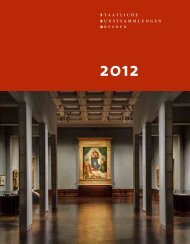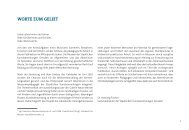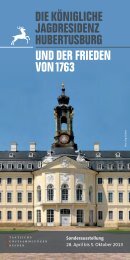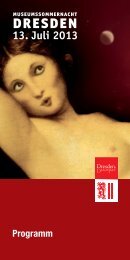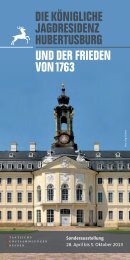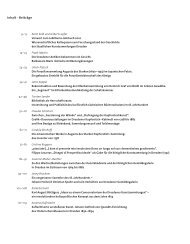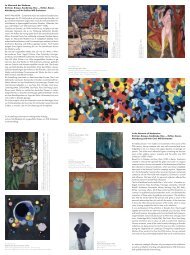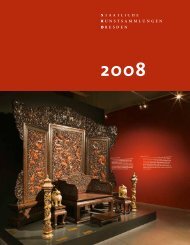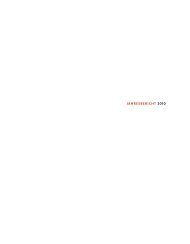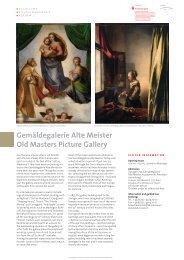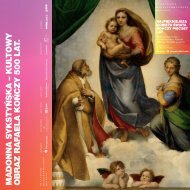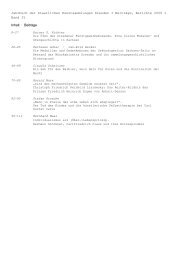2009 - Staatliche Kunstsammlungen Dresden
2009 - Staatliche Kunstsammlungen Dresden
2009 - Staatliche Kunstsammlungen Dresden
Create successful ePaper yourself
Turn your PDF publications into a flip-book with our unique Google optimized e-Paper software.
The signing of the cooperation agreement between the <strong>Staatliche</strong><br />
<strong>Kunstsammlungen</strong> <strong>Dresden</strong> and the <strong>Staatliche</strong> Ethnographische Sammlungen<br />
Sachsen during the press conference on 13 th January <strong>2009</strong>: (left to right)<br />
Dr. Eva-Maria Stange, Dr. Claus Deimel, Prof. Dr. Martin Roth<br />
30 StA AtLICH E KU NStSAMMLU NGEN<br />
AN D StA AtLICH E EtH NOGRAPH ISCH E<br />
SAMMLU NGEN SIGN COOPERAtION<br />
AGREEMENt<br />
“The <strong>Staatliche</strong> <strong>Kunstsammlungen</strong> <strong>Dresden</strong> and the<br />
<strong>Staatliche</strong> Ethnographische Sammlungen Sachsen hold<br />
collections reflecting artistic and cultural history which<br />
complement one another perfectly,” said Saxony’s Minister<br />
for the Arts Dr. Eva-Maria Stange when the two institutions<br />
signed a cooperation agreement in mid-January <strong>2009</strong>. “The<br />
two collections are moving closer together in order to be<br />
able in future to tap their full potential through joint<br />
projects, exhibitions and research, as well as through joint<br />
marketing,” said Dr. Stange. Furthermore, practical aspects<br />
such as the sharing of administrative, marketing and<br />
technical services also played a role in the decision to<br />
enter into the cooperation agreement. Like the <strong>Staatliche</strong><br />
<strong>Kunstsammlungen</strong>, the roots of the Ethnographische<br />
Sammlungen lie in the Kunstkammer, which was established<br />
by Elector August I of Saxony in 1560 and the 450th<br />
anniversary of which is to be celebrated in a major Jubilee<br />
Exhibition in 2010. The objects held in the Ethnographische<br />
Sammlungen constitute an immense cultural legacy of the<br />
peoples of the world. That the <strong>Staatliche</strong> <strong>Kunstsammlungen</strong><br />
should be placed more firmly into this context than<br />
has hitherto been the case is something that Prof. Dr.<br />
Martin Roth, Director-General of the <strong>Staatliche</strong> <strong>Kunstsammlungen</strong><br />
<strong>Dresden</strong> considers a challenge and a pleasing<br />
GRASSI Museum für Völkerkunde<br />
zu Leipzig<br />
enrichment: “Both partners can only benefit from this<br />
cooperation,” he says. Dr. Claus Deimel, Director of the<br />
<strong>Staatliche</strong> Ethnographische Sammlungen Sachsen,<br />
stresses the significant potential of his collections, the<br />
global perception of which is to be emphasised amongst<br />
art historians as part of this cooperation agreement:<br />
“Nowadays an ethnographical museum has to take<br />
greater account of developments in worldwide art and<br />
culture than was the case in the past. What were formerly<br />
considered ‘primitive peoples’ are now self-confident<br />
representatives of contemporary art and indigenous politics.<br />
We must respond to this and develop our cooperation<br />
accordingly. The alliance between the traditional ethnographic<br />
collections in Leipzig, <strong>Dresden</strong> and Herrnhut<br />
within the interdisciplinary context of the <strong>Dresden</strong> art<br />
collections will strengthen the performance of both institutions.<br />
However, the aim is also to draw the attention of<br />
audiences who were previously only interested in classical<br />
art history to the lifeworlds of cultures around the globe.“<br />
“If the cooperation agreed upon is successful during this<br />
‘trial year’, it is planned that the <strong>Staatliche</strong> Ethnographische<br />
Sammlungen Sachsen will join the alliance of the<br />
<strong>Staatliche</strong> <strong>Kunstsammlungen</strong> <strong>Dresden</strong> on 1 st January<br />
2010,” explained Minister Dr. Stange. This intended structural<br />
unification will take account of the intensification of<br />
globalisation, as a result of which ever greater tolerance<br />
and intercultural competence are required. Ethnographical<br />
museums are particularly well suited to the promotion of<br />
these skills.



